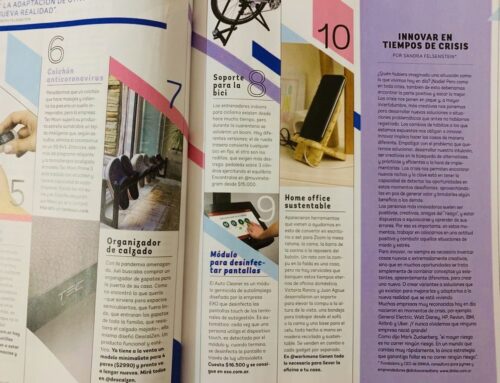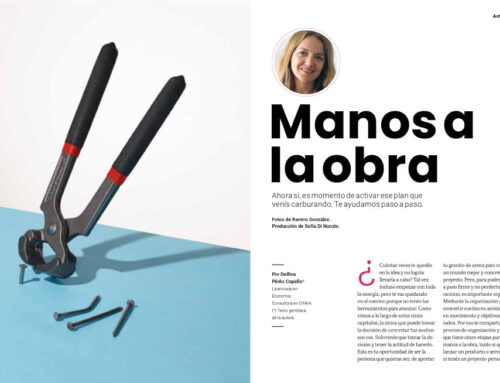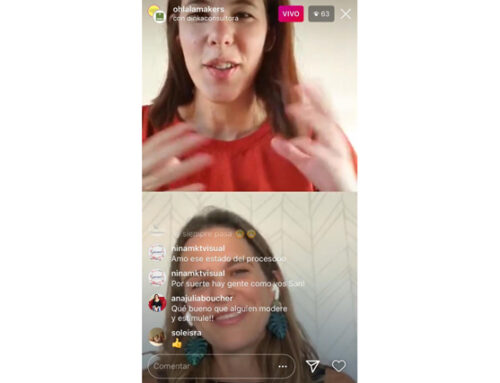WHO AM I? How many times do you have to answer this question? Surely thousands. Many times you will have answered only your name. Others, your profession or occupation. How easy or safe are those labels for us, right? “I am an accountant”, “I am the mother of…”, “I am an artist”. Sometimes it is more comfortable to answer this question with the artillery of titles, links and comparisons that we believe give us support, define us or inflate our chests, but... Who are we really? Are we defined beings or are we in constant construction? We invite you to discover it in this first chapter.
We start the first chapter with big questions. How did it feel to have to answer who you are? Was it difficult or easy for you? Whatever your situation, the idea is to accompany you so that, after these first pages, you can reconnect with yourself and also look at yourself differently, to face projects with more confidence.
To be able to look at yourself from another side, the first step we suggest is to leave behind the labels, titles, links, and mentions that you bring with you. And, to embark on this path, a good starting point is to be aware of this enormous list of identifications. Because things are not always as they were not told or as we believed. But we go step by step.
THE OBSERVER PRINCIPLE
How many times do you have a fixed idea and you don't stop until you find someone who has your same perspective on the subject? And how many, once you have achieved your goal, do you realize that it wasn't quite like that either? How much wasted energy! Accepting that there is an other who feels, sees and really believes that something is different, frees us and forces us, at the same time, to the responsibility and challenge of learning to live together with and in our differences.
The observer principle is one of the basic principles of ontological coaching; part of establishing that we do not know how things really are, but that
we simply know how we observe or interpret them. We live in interpretive worlds. What is reality, then? Is it what we can observe with our senses or is it something different?
Our perception of reality is conditioned by many factors. We are being influenced and molded by:
• Different situations and circumstances that surround us.
• Our judgments and opinions.
• The experiences lived.
• Our successes and failures.
• The companies.
• Teachings, norms of the culture, of the time (what
• Carl G. Jung called the collective unconscious).
SHUFFLE AND DEAL AGAIN
So: is reality something objective, unalterable, static? No. On the next page we share a not-so-traditional version of a classic story to exemplify that perhaps not everything is as we were told.
THE SLANDER WOLF
The forest was my home. I lived there and took care of him. I tried to keep it clean and pretty. On a sunny day, while I was removing trash left by a caravan, I heard footsteps. I jumped and hid behind a tree and saw a little girl coming down the path, carrying a basket.
I immediately suspected her because she was dressed in a ridiculous way, all in red and with her head covered as if she didn't want anyone to recognize her. Clearly I stopped to find out who it was. I asked him: I also asked him where he was going and other things like that.
He told me that he was going to see his grandmother to bring her food. Deep down, she seemed pretty honest to me, but she was in my forest, of course, she looked strange with that strange hood. So I decided to show her how dangerous it was to cross the forest alone while dressed like that. I let him continue on his way, but I went ahead to his grandmother's house. When I saw that kind old lady, I explained my concern to her and she agreed that her granddaughter needs a lesson right away. We agreed that grandma would hide under the bed until I called her.
When the little girl arrived, I invited her to enter the sleeping room; I had gone to bed dressed up in grandma's clothes. The girl, all white and red, came in and said something not nice about my big ears. They had already insulted me before and then I made an effort and suggested to him that my big ears helped me a lot to hear better. She made another comment about my bulging eyes. You can imagine what I began to feel about that unfriendly girl. And, since it was normal for me to turn the other cheek, I told her that my bulging eyes helped me see her better.
The next insult hurt me deeply. In fact, my problem is that I have very large teeth and she made an offensive remark about them.
I know I should have controlled myself, but I jumped out of bed and told her, grunting, that they were going to help me eat her better.
Let's be serious: no wolf would eat a girl and everyone knows it. But the little girl started running around the house like a crazy person, screaming and I followed her to calm her down.
I took off my grandmother's clothes and it was even worse. Suddenly, the door of the house opened and a huge ranger appeared with an axe. I looked into his eyes and it didn't take me long to understand that I had gotten myself into trouble. Behind me, there was an open window and I escaped through it without a second thought.
I would like to say how the whole story ended, but that grandmother never told my side. Before long, word spread that I was a very bad and unfriendly guy, and everyone started avoiding me. I haven't heard from the girl, who was wearing that ridiculous red hood, but after that day I couldn't be happy anymore.
How many times are you convinced of something and life, with a slap in the face, changes your perspective and, from there, the way you see and think? Without going any further, the isolation we experienced with the coronavirus forced us to stop, showed us a new way of living, of communicating, and set other priorities. Perhaps emptiness has also appeared, our need for change has become evident: change of life, job, home, relationships and, along with that, the fear of changing. Looking at it carefully, it is hopeful to consider the opportunity to change, to transform yourself. Looking at that reality as you have never done before until now is the proposal and the challenge. Understanding who you really are, how you became the person you are being right now, understanding what your lenses are, your prescription, your frame, your tint. This is the beginning of a self-view, the beginning of self-knowledge and conscious observation. This will help you know what resonates with you and what doesn't. What do you feel true and what would you like to change.
RECONNECT TO GROW
Connecting with yourself will always help you live from a more shaped self-reference, it will help you understand that there is a lot that you inherited from others that you may want to leave behind. There are a thousand and one ways to travel this winding path and, honestly, it never ends. We can say that it is a process to recognize ourselves, take care of ourselves, develop ourselves and feel comfortable in our own skin. Although there is always something to improve and discover, don't you think? What fun would life be if it were not a path of learning; However, how many times have you wanted to change something, stop acting or feeling a certain way, and it disheartens you to see that it is very difficult for you. Don't worry, contrary to what we have been led to believe, if we don't propose them, we can all change. To begin with, we will act differently and, therefore, the result will change. As Albert Einstein said: “If you always do the same thing, don't expect different results.” Let's go, then, for the new results!
YOUR COHERENCE STRUCTURE
You begin the process of looking at yourself and it seems that there is something that repeats itself, over and over again, like a pattern. This has to do with what in coaching we identify as the coherence structure. This structure is made up of body, language and emotion. How many times do politically correct answers come out of your mouth? How many others don't dare to say “no”? Many times it happens that, even if you don't say it, in reality, something bothers you and your body takes its toll through stomach pain (body) or excessive crying (emotion); or, on the contrary, you spontaneously respond in an outrageous way, that is, you speak without a filter (language). Our structure is not independent, it is not autonomous, and it is very important to take note of our automatic reactions and responses, to pay attention to what happens to us in these fields, if we hope to understand what is happening to us with what concerns us. Let's try an exercise. Imagine that you are faced with that conversation, meeting or uncomfortable situation again: would you like it to be different? So take a moment and after experiencing it, write down:
• Is what you said really what you thought?
• Did your body show you any particular sensations?
• What emotion could you relate to that moment you just experienced?
This will be the starting point to look at yourself differently. Now that you know that your idea of who you are is made up of endless data and learned and inherited beliefs that may say little about you, it is worth remembering that this applies to everyone.
TOOLBOX
TOOLS TO KNOW YOU DEEPLY
PODCAST: Enric Corbera, Emotional inheritances, a punishment or an opportunity?
TED TALK: Catherine Reitman, A guide to believing in yourself.
BOOK: Deepak Chopra, The 7 Spiritual Laws of Success.
E-BOOK: Andrea Churba, The skills we develop in quarantine.
By Cecilia Faraco
Bachelor of Marketing and ontological coach
Consultant and coach at DINKA








